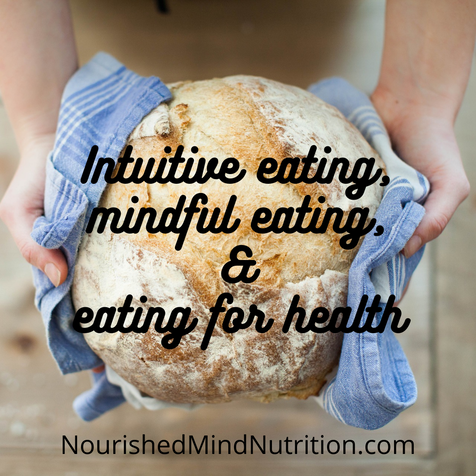 The pervasiveness of diet culture in the world today teaches us that we must create rigid rules around our consumption of food, and we must feel guilt and shame when we break those rules. We certainly must not allow ourselves to enjoy food (unless it checks all the boxes of what we believe counts as “healthy”). On the other hand, the intuitive eating approach tells us that for the sake of our health, we must reject all diets and the limiting food rules that cause us to distrust our bodies' innate sense of our needs. Instead, we are told to eat when, where, and we want. On the other-other hand, the mindful eating approach tells us that we must focus more on food while we eat, tune into our hunger and fullness cues and learn to truly appreciate our food for the nourishment it gives us, as well as the taste, texture, scent, etc. Yet we all know that there are some nutrients that we need more of, and some nutrients that are better for us to eat less of. We all know that some foods are filled with more of the nutrients we need more of, and those are the foods we consider "nutrient-dense," while others are just kind of empty of most of those nutrients, and others are pretty high in the nutrients we know we should be eating less of. Other foods might be processed in a way that, when eaten regularly, is known to be harmful to our health. So does being anti-diet mean that we are also anti-health? Does intuitive eating mean that we believe that we can really subsist on Oreos all day, every day if that’s what we’re craving? And where does mindful eating fit in? Is it okay to diet as long as we’re eating mindfully? Sometimes having so many different terms wrapped around a topic can create a lot of confusion. There is a lot of overlap, for example, between mindful eating and intuitive eating, and there actually can be a fair amount of overlap between mindful eating and diet culture, as well. The terms themselves can be useful to help us understand the concept, but just like labeling your diet as “plant-forward,” “vegetarian,” “vegan,” or “pescetarian,” the terms can become somewhat limiting. There are often reasons to incorporate multiple approaches and to be flexible in our lives and in our diets. It can be helpful to use terms and labels to learn about a topic or to explain it to others, but it can also be helpful to lose the terms sometimes, and just explain things as we see them. So, here’s how I see it. I believe that rigid rules and restrictions around food can be harmful to the mental and physical health of the people who believe in them (whether or not they actually adhere to them). I think these rules can damage their relationship with food, with their own bodies, and their relationships with others. I believe that good nutrition includes nourishing the body and the mind – both from a biological perspective and from an experiential and psychological one. We nourish ourselves by eating food that contains the nutrients that our bodies and brains need for good health. But we also nourish ourselves by spending time eating food with others – we build relationships through and around food and eating. We also nourish ourselves by listening to our bodies’ cues of hunger and fullness; respecting our bodies enough to give them energy and nutrients when we feel those cues of hunger and sitting back from the table to allow comfortable digestion of those nutrients when we feel that sensation of fullness. We also nourish our bodies and minds through mindful enjoyment of the experience of eating and being fully present in the moment, without the accompanying guilt and shame of over-attentiveness to food and eating that is often present when dieting. (When I first started teaching classes on mindful eating, I used to use the formula Mindfulness = Awareness – Anxiety to explain this concept.) We also nourish ourselves through the gratitude that we feel and express when we eat mindfully, as we recognize all that went into bringing our food into existence and onto our plates, and the incredible process by which our bodies will use the components of that food to rebuild, grow, and fuel the living of our lives! As Thanksgiving approaches this year, I encourage you to try to shift your focus away from “shoulds” and “shouldn’ts,” and towards gratitude for the food in front of you, the people around you, and the body that carries you through the world. What do you think about these terms and other common terms surrounding our relationships with food? Leave me a comment and let me know! And if you’d like more personalized guidance, schedule an appointment with me! I’d love to work with you. Happy Thanksgiving!
0 Comments
Leave a Reply. |
AuthorErica Golden, RDN Archives
March 2024
Categories |
 RSS Feed
RSS Feed
